DAPHNE DU MAURIER & GERTRUDE LAWRENCE
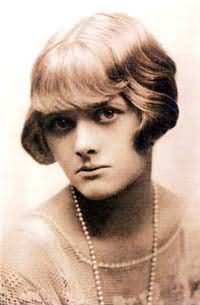 Daphne, Lady Browning DBE (13 May 1907–19 April 1989), commonly known as Dame Daphne du Maurier, was a famous British novelist, playwright and short story writer. Many of her works were adapted into films, such as one of her most famous books, Rebecca, which won the Best Picture Oscar in 1940 for director Alfred Hitchcock, who would later bring her short story, The Birds, onto the big screen.
Daphne, Lady Browning DBE (13 May 1907–19 April 1989), commonly known as Dame Daphne du Maurier, was a famous British novelist, playwright and short story writer. Many of her works were adapted into films, such as one of her most famous books, Rebecca, which won the Best Picture Oscar in 1940 for director Alfred Hitchcock, who would later bring her short story, The Birds, onto the big screen. A 1993 biography provides extensive information about du Maurier's "Venetian tendencies." Her father was outspokenly homophobic, and even as an adult du Maurier repressed her own homosexual desires. She believed she channeled this "male energy" into her work. In 1947 she met and fell in love with Ellen Doubleday who, however, did not reciprocate. Du Maurier then took up with actress Gertrude Lawrence in a relationship that continued until Lawrence's death in 1952.
Daphne du Maurier was born in London (although she spent most of her life in her beloved Cornwall), the second of three daughters of the famous actor-manager Sir Gerald du Maurier and actress Muriel Beaumont (maternal niece of William Comyns Beaumont). Her grandfather was the author and Punch cartoonist George du Maurier, who created the character of Svengali in the novel Trilby. These connections gave her a head start in her literary career; Du Maurier published some of her very early work in his Bystander magazine, and her first novel, The Loving Spirit, was published in 1931. Du Maurier was also the cousin of the Llewelyn Davies boys, who served as J.M. Barrie's inspiration for the characters in the play Peter Pan, or The Boy Who Wouldn't Grow Up. As a young child she was introduced to many of the brightest stars of the theatre thanks to the celebrity of her father; notably, on meeting Tallulah Bankhead she was quoted as saying that the actress was the most beautiful creature she had ever seen.
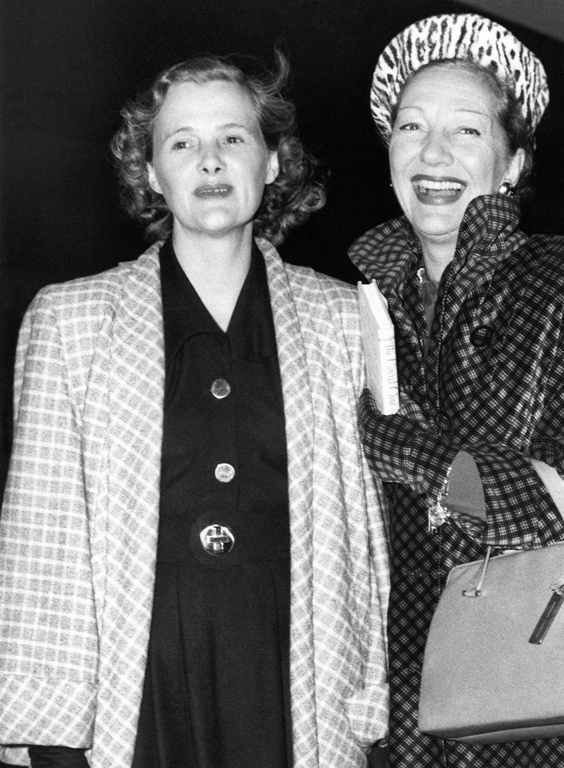
English author and playwright Daphne du Maurier (left) with English actress Gertrude Lawrence at London’s Waterloo Station in this photo from October 1948. (Associated Press file photo)
Gertrude Lawrence (July 4, 1898–September 6, 1952) was an English actress, singer, dancer and musical comedy performer known for her stage appearances in London's West End and on New York's Broadway. Lawrence had a love affair with Beatrice Lilly and an enduring and passionate relationship with British author Daphne du Maurier (May 13, 1907–April 19, 1989). Love letters written between Lawrence and du Maurier were published in a 1993 biography of du Maurier, who outlived Lawrence by many years.
She married Lieutenant-General Sir Frederick "Boy" Browning and had two daughters and a son (Tessa, Flavia and Christian). Biographers have drawn attention to the fact that the marriage was at times somewhat chilly and that du Maurier could be aloof and distant to her children, especially the girls, when immersed in her writing. However, as a product of well-to-do Edwardian society in which the nanny dealt with the children, this is hardly surprising.
Indeed, she has often been painted as a frostily private recluse who rarely mixed in society or gave interviews. A notable exception to this came after the release of the film A Bridge Too Far in which her late husband was portrayed in a less-than-flattering light. Du Maurier was incensed and wrote to the national newspapers decrying what she considered unforgivable treatment. Once out of the glare of the public spotlight, however, many remembered her as a warm and immensely funny person who was a welcoming hostess to guests at Menabilly, the house she leased for many years (from the Rashleigh family) in Cornwall. "Boy" died in 1965 and soon after Daphne moved to Kilmarth which became the setting for The House on the Strand.
After her death in 1989, numerous references were made to her alleged lesbianism; an affair with Gertrude Lawrence as well as her infatuation for the wife of her American publisher, Ellen Doubleday, were cited. Du Maurier stated in her memoirs that her father had wanted a son and being a tomboy, she had naturally wished to have been born a boy. However, this is perhaps too simplistic an explanation: a childhood brought into contact with the theatrical and artistic people of her parents' circle, many of whom were homosexual, should have meant for a liberal atmosphere. Yet strangely for a man in his profession, her father was vociferously homophobic. For a daughter who virtually worshipped her father, this was bound to have major repercussions in later life; guilt, shame and an instilled belief that homosexuality was utterly abhorrent could not have helped her form rational conclusions to her own doubts and anxieties. In letters released to her official biographer after her death, du Maurier explained to a trusted few her own unique slant on her sexuality; her personality, she informs, comprises two distinct people: the loving wife and mother (the side she shows to the world) and the lover, a decidedly male energy, hidden to virtually everyone and the power behind her artistic creativity. Du Maurier evidently believed this was the demon which fueled her creative life as a writer. One can best try to understand this if one looks to those novels such as The Scapegoat or The House on the Strand, written in the first person and as men, and being utterly convincing.
In the Queen's Birthday Honours List for June 1969, Daphne du Maurier was created a Dame of the British Empire. She never used the title and according to her biographer Margaret Forster (
Daphne du Maurier, Chatto and Windus, 1993, ISBN 0701136995), she told no-one about the honour. Even her children learned of it from the newspapers.
http://www.elisarolle.com/romance/images/49_blockquote.gif); background-color: rgb(243, 243, 243); background-position: 0% 0%; background-repeat: no-repeat no-repeat;">"She thought of pleading illness for the investiture, until her children insisted it would be a great day for the older grandchildren. So she went through with it, though she slipped out quietly afterwards to avoid the attention of the press" (page 370).She died at the age of 81 at her home in Cornwall, the region which had been the setting for many of her books. In accordance with her wishes, her body was cremated and her ashes were scattered on the cliffs near her home.
In late 2006 a previously unknown work titled And His Letters Grew Colder was discovered. This was estimated to have been written in the late 1920s, and takes the form of a series of letters tracing an adulterous passionate affair from initial ardour to deflated acrimony.
Source: http://en.wikipedia.org/wiki/Daphne_du_m
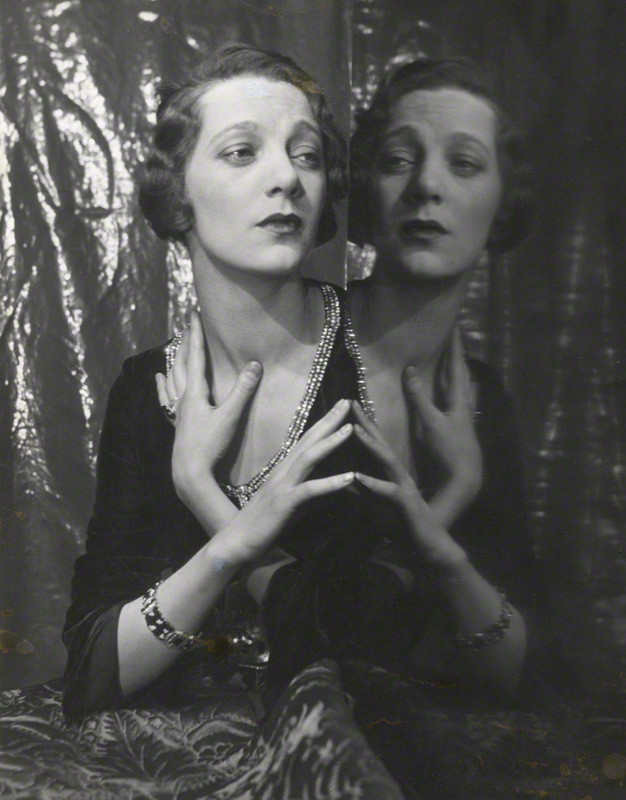 Gertrude Lawrence (July 4, 1898 – September 6, 1952) was an English actress, singer, dancer and musical comedy performer known for her stage appearances in London's West End and on New York's Broadway. Lawrence had a love affair with Beatrice Lilly and an enduring and passionate relationship with British author Daphne du Maurier (May 13, 1907 – April 19, 1989). Love letters written between Lawrence and du Maurier were published in a 1993 biography of du Maurier, who outlived Lawrence by many years.
Gertrude Lawrence (July 4, 1898 – September 6, 1952) was an English actress, singer, dancer and musical comedy performer known for her stage appearances in London's West End and on New York's Broadway. Lawrence had a love affair with Beatrice Lilly and an enduring and passionate relationship with British author Daphne du Maurier (May 13, 1907 – April 19, 1989). Love letters written between Lawrence and du Maurier were published in a 1993 biography of du Maurier, who outlived Lawrence by many years. Lawrence was born Gertrude Alice Dagmar Klasen, of English and Danish extraction, in the Newington area of London Borough of Southwark. Her father was a basso profundo who performed under the name Arthur Lawrence. His heavy drinking led her mother Alice to leave him soon after Gertrude's birth.
In 1904, her stepfather took the family to Bognor on the Sussex coast for the August bank holiday. While there, they attended a concert where audience members were invited to entertain. At her mother's urging, young Gertrude sang a song and was rewarded with a gold sovereign for her effort. It was her first public performance.
In 1908, in order to augment the family's meager income, Alice accepted a job in the chorus of the Christmas pantomime at Brixton Theatre. A child who could sing and dance was needed to round out the troupe, and Alice volunteered her daughter. While working in the production Alice heard of Italia Conti, who taught dance, elocution and the rudiments of acting. Gertrude auditioned for Conti, who thought the child was talented enough to warrant free lessons.
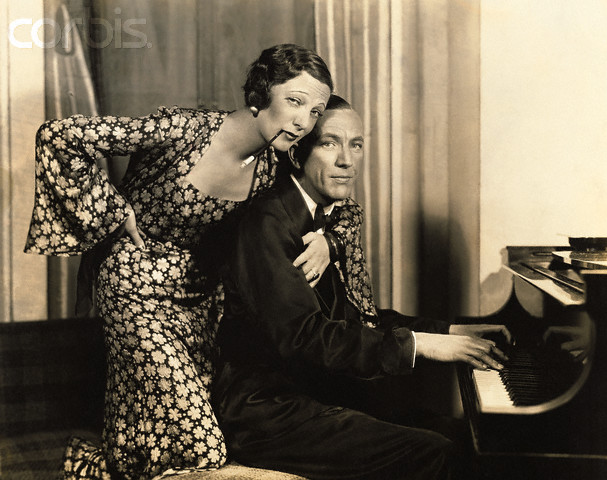
Gertrude Lawrence and Noel Coward
Her training led to appearances in Max Reinhardt's The Miracle in London and Fifinella, directed by Basil Dean, for the Liverpool Repertory Theatre. At some point during this period, the child decided to adopt her father's professional surname as her own. Dean then cast her in his next production, Gerhart Hauptmann's Hannele, where she first met Noël Coward. Their meeting was the start of a close and sometimes tempestuous friendship and the most important professional relationship in both their lives.
In 1945, Lawrence published the autobiography A Star Danced. Her longtime friend Noël Coward later suggested it was a romanticised and less than wholly factual account of her life. Although Lawrence claimed the work was solely hers, many suspected her business manager and attorney Fanny Holtzmann had written much of it. The author embarked on a cross-country tour of the United States to publicise her book, the first person ever to engage in such a promotion.
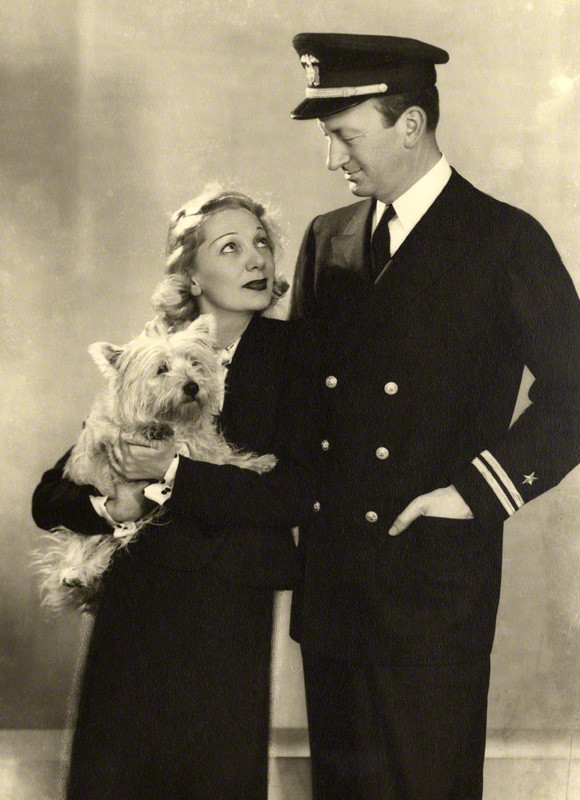 Lawrence's second husband Richard Aldrich became a lieutenant in the United States Navy during World War II, during which time Lawrence had a standing invitation to perform for British troops from the head of the UK's Entertainments National Service Association. Her chief obstacle was getting from her home in Massachusetts to Britain. Aldrich was overseas at the time. In her 1945 memoir A Star Danced, she recalled, "After weeks of more or less patient waiting, repeated timid, pleading, urgent and finally importunate requests to the authorities who rule such matters in Washington and London, and a rapid-fire barrage of telegrams, cables and telephone calls, it had happened. At last I had permission to do what I had been wanting desperately to do for four years—go to England and do my bit on a tour for E.N.S.A."
Lawrence's second husband Richard Aldrich became a lieutenant in the United States Navy during World War II, during which time Lawrence had a standing invitation to perform for British troops from the head of the UK's Entertainments National Service Association. Her chief obstacle was getting from her home in Massachusetts to Britain. Aldrich was overseas at the time. In her 1945 memoir A Star Danced, she recalled, "After weeks of more or less patient waiting, repeated timid, pleading, urgent and finally importunate requests to the authorities who rule such matters in Washington and London, and a rapid-fire barrage of telegrams, cables and telephone calls, it had happened. At last I had permission to do what I had been wanting desperately to do for four years—go to England and do my bit on a tour for E.N.S.A."Lawrence's attorney booked the actress on a British Airways charter flight from Washington, D.C. to an airfield near London that lasted 36 hours, including two refuelling stops. When Lawrence boarded the plane, she discovered that she, Ernest Hemingway and Beatrice Lillie were among the few passengers without diplomatic passports. Lawrence and Lillie were the only female passengers. Hours after landing near London, she performed with E.N.S.A. for British and American troops who, it turned out, had been deployed for the imminent D-Day landings in Normandy. Aldrich was in one of the squadrons of the U.S. Navy.
Aldrich wrote in his 1954 biography of his recently deceased wife:
She went over with the first E.N.S.A. unit to go into France, making the crossing in an LST (Landing Ship, Tank). Others in the party included Ivor Novello, Margaret Rutherford, Diana Wynyard and Bobbie Andrews. In her autobiography, A Star Danced, she has given a graphic account of their landing on a Normandy beach and of the progress of her unit through the wrecked towns, where there was still no water or electricity. Shows were given in shell-torn cinemas and hastily lighted casinos.As Allied forces scored more victories in the South Pacific later that year, Lawrence endured long plane rides and dangerous conditions to perform for troops there. The Aldrich book includes a photograph of Lawrence and two unidentified performers standing next to a military plane in Angaur that had just transported them there from Ulithi.
The physical discomforts – the sleeping in attics, the total lack of sanitation, the scanty and poor food – Gertrude could and did take as fortunes of war. What bothered her more was the breakdown in communications with me. Always dependent upon getting frequent letters from those she loved, she chafed and worried because no mail reached her.
In 1948, Lawrence returned to Britain to star in September Tide, a play written specifically for her by Daphne du Maurier. Her role was that of a middle-aged Cornish woman whose son-in-law, a bohemian artist, falls in love with her. The playwright had intended her to open the play on Broadway, but Lawrence's husband thought it was too British for the American market. The London press paid scant attention to her return, and Lawrence was distressed to discover that in a country struggling to recover from the effects of World War II, the public no longer was as interested in the private lives of stage stars as it once had been. Prior to opening in the West End, the play toured Blackpool, Leeds, Liverpool and Manchester, where the frequently sparse audiences consisted primarily of elderly people who remembered Lawrence from her heyday. While on the road, she underwent erratic mood swings and frequently clashed with her fellow cast members, including actors Michael Gough and Bryan Forbes, and the crew. The play opened in London in mid-December 1948. Writing in Punch, Eric Keown called her return "an occasion for rejoicing" but dismissed the play as "an artificial piece of conventional sentiment which leaves the actress's talents unused." She remained with the play until July 1949, then returned to the United States, where she performed her role for one week at her husband's theatre in Dennis.
According to an authorised 1993 biography of the author and playwright by Margaret Forster, Lawrence and du Maurier became close friends during the London production of September Tide. The nature of their relationship remained unclear following the 1989 death of du Maurier. Forster quotes du Maurier as saying the following about Lawrence circa 1949, "To be blatantly vulgar, anyone with a spice of imagination would prefer a divan with Gertrude to a double-bed with her."
Lawrence biographer Sheridan Morley interviewed du Maurier for his 1981 book Gertrude Lawrence. Du Maurier was quoted as saying she called Lawrence by the nickname "Cinders," short for Cinderella. Either while negotiating to appear in September Tide or rehearsing it, Lawrence stayed in "a flat in London somewhere," according to what du Maurier told Morley decades later. Boiling water in her tea kettle for a visitor was stressful for Lawrence. Du Maurier also told the biographer that she had forgotten all the dialogue she had written for September Tide and that shortly before her interview with Morley she had "been searching my shelves for a copy of the play. ... I cannot remember how Cinders looked, what she wore, far less what she said." Du Maurier's contribution to the Morley biography of Lawrence consists of little more than that. Nothing about a personal connection between Gertrude Lawrence and Daphne du Maurier was published during Lawrence's lifetime. Two years after Lawrence's death, her widower Richard Aldrich had this to say in a best-selling book:
All her ingenuous traits, which could be annoying as well as endearing, would be swept away by her courage, her clear perception of truth, and the divine compassion which could flood her heart and lift her to the heights of nobility.In 1950, Lawrence's business manager and attorney Fanny Holtzmann was looking for a new property for her client when the 1944 Margaret Landon book Anna and the King of Siam was sent to her by the William Morris agent who represented Landon. He thought a stage adaptation of the book would be an ideal vehicle for the actress. Holtzmann agreed, but proposed a musical version would be better. Lawrence wanted Cole Porter to write the score, but when he proved to be unenthused by the suggestion, Holtzmann sent the book to Richard Rodgers and Oscar Hammerstein II. Rodgers initially demurred because he felt Lawrence's vocal range was limited and she had a tendency to sing flat. But he realised the story had strong potential, and the two men agreed to write what ultimately became The King and I.
I am sure that she was frequently bewildered by the rapidity and mutability of her own impulses. Possessed, as she was, of an intuitive rather than an analytical intelligence, I doubt that she really understood herself clearly, any more than did most of those who thought they knew her intimately. An exception in this regard was Daphne du Maurier.
During those months in England [when September Tide was in production], Gertrude and Daphne formed a warm friendship, which continued unbroken after Gertrude's return to America. Daphne later returned the visit by being Gertrude's guest in New York. Daphne's subsequent best-selling novel Mary Anne was originally planned as a possible starring vehicle for Gertrude.
It was chiefly from comments made later by Daphne that I was able to reconstruct the full picture of Gertrude's inner conflict during her stay in London. Daphne spoke of Gertrude's moodiness, her variability, her sense of vague self-dissatisfaction. To other English friends, Gertrude talked wistfully of wanting to remain in England, "where I belong."
It opened on Broadway in March 1951, and Lawrence won the Tony Award for Best Actress in a Musical for her performance. Her triumph was short-lived; her health deteriorated rapidly, forcing her to miss numerous performances until she finally was hospitalised. While bedridden in NewYork-Presbyterian Hospital, on Friday afternoon, September 5, 1952, less than 24 hours before her death, she instructed Holtzmann to arrange for co-star Yul Brynner's name to be added to the marquee of the St. James Theatre, which included only Lawrence's name at the time.
On August 16, 1952, Lawrence fainted backstage immediately after finishing a Saturday matinee of The King and I. After "a few days at home," wrote Aldrich, she was admitted to New York-Presbyterian Hospital for tests. Doctors said she was suffering from hepatitis, and she was admitted to a room on the 16th floor. Her former son-in-law, Dr. Bill Cahan, suspected liver cancer might be a more accurate diagnosis, and early on the morning of September 6, doctors performed a biopsy of her liver. Lawrence slipped into a coma, and her husband phoned Cahan, who rushed to the hospital. Lawrence, who had not seen Cahan in years, briefly opened her eyes, seemed puzzled by his presence, and then died. A subsequent autopsy confirmed that she did have cancer. Doctors performing the autopsy did not agree on whether the cancer had originated in the liver, but they did determine that she had cancer, not hepatitis.
According to the New York Times, 5,000 people crowded the intersection of East 55th Street and Fifth Avenue in Manhattan, while 1,800 others, including Yul Brynner, Connecticut Governor John Davis Lodge, Marlene Dietrich, Phil Silvers, Luise Rainer, Moss Hart and his wife Kitty Carlisle filled Fifth Avenue Presbyterian Church for Lawrence's funeral. In his eulogy, Oscar Hammerstein II quoted from an essay on death written by poet and novelist Rabindranath Tagore. Lawrence was buried in the champagne-coloured gown worn for the "Shall We Dance?" number in the second act of The King and I, and she was interred in the Aldrich family plot in Lakeview Cemetery in Upton, Massachusetts.
Janet McTeer portrayed Lawrence opposite Geraldine Somerville as Daphne du Maurier and Malcolm Sinclair as Noël Coward in Daphne, a 2007 television movie broadcast by the BBC.